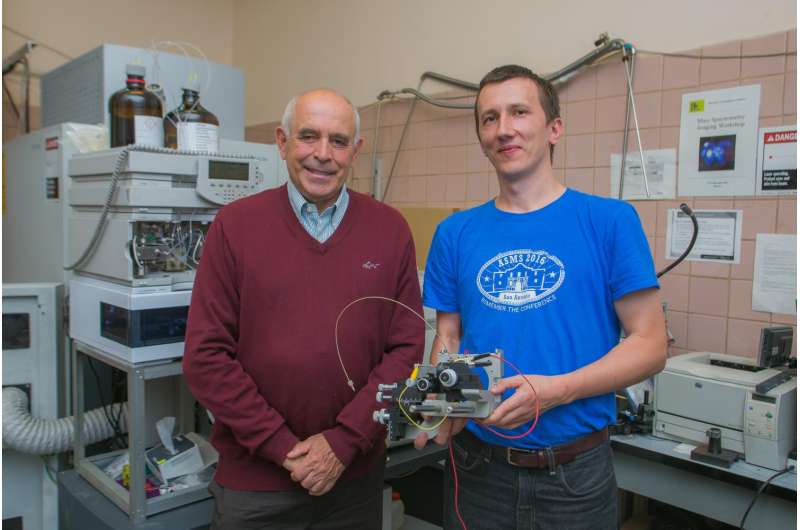Head of team Prof. Evgeny Nikovaev and senior fellow Alexey Kononikhin in front of Ultra High Resolution MS instrument. Credit: MIPT
Experts from the V. I. Kulakov Research Center for Obstetrics, Gynecology and Perinatology and the Moscow Institute of Physics and Technology (MIPT) have devised a method that uses the urinary proteome to diagnose conditions in newborn babies. In the future, this urine-based diagnostic method will enable specialists not only to detect a disease, but also to control the therapeutic response and rehabilitation periods without causing pain. The findings have been published in the Journal of Proteomics.
The majority of patients in neonatal intensive care units are premature babies who often have respiratory conditions. It is important to know whether the cause of their illness is an infection or a failure in the developmental process. Most of the diagnostic procedures in neonatal intensive therapy are invasive—tissue is destroyed during such procedures as biopsy or blood sampling. The composition of biological fluids is highly complex. Using high-performance mass spectrometry, the researchers are identifying proteins in target fluids by measuring their masses and determining protein concentrations by measuring peak intensities in their mass spectra. They carefully conducted bioinformatic processing of the data. As a result, they singled out 36 proteins that indicate if respiratory pathologies are infectious (congenital pneumonia) or non-infectious (tachypnea, infant respiratory distress syndrome).
According to the authors, the urinary proteome of adults has been studied for more than 30 years, but studies of the urinary proteome in pediatrics, especially in neonatology, are limited. In order to further specify the defined infant-specific dataset, proteins were compared with the urinary proteome of healthy adults (men and pregnant women).
"In our pilot study, we succeeded in defining the core urinary proteome and proteins specific for infants and pathological conditions. We are pioneers in the non-invasive identification of urinary biomarkers diagnosing respiratory conditions in newborns. The results are optimistic and will serve as a platform to move forward in developing a method of monitoring conditions in newborns," says one of the authors, Professor Evgeny Nikolaev, head of MIPT's Laboratory of Ionic and Molecular Physics.
The scientists previously published a paper on diagnosing pregnancy disorders using urine samples from pregnant women. They are now proposing a similar non-invasive method to monitor conditions in preterm newborns
More information: Natalia L. Starodubtseva et al, Investigation of urine proteome of preterm newborns with respiratory pathologies, Journal of Proteomics (2016). DOI: 10.1016/j.jprot.2016.06.012
Provided by Moscow Institute of Physics and Technology























